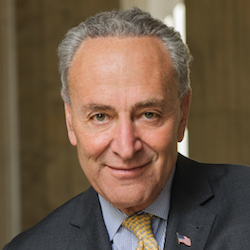
At least two federal lawmakers are concerned that the 10-year projections on the budget and economy released Monday by the Congressional Budget Office will lead to GOP attempts to make cuts to programs such as Medicare and Social Security.
“From day one, the Republican agenda has always been to balloon the deficit in order to dole out massive tax breaks to the largest corporations and wealthiest Americans, and then use the deficit as an excuse to cut Social Security and Medicare,” Senate Minority Leader Chuck Schumer (D-NY) said Monday in a Facebook post.
Senate Finance Committee Ranking Member Ron Wyden (D-OR) also expressed concerns. “This report puts hard numbers on a fact we’ve known for months: Republicans passed a massive tax giveaway to corporations and wealthy donors, leaving a big hole in the budget they plan to fill by going after Medicare, Medicaid and Social Security,” he said in a statement. “The cuts and harmful changes Republicans in Congress want will mean seniors can no longer depend on the guaranteed benefits Medicare, Medicaid and Social Security provide today.”
In December, Republicans lawmakers signaled their intention to reduce spending on Medicare and Medicaid in 2018, although they later seemed to back off of trying to make major changes in an election year.
The federal deficit will increase 21% to $804 billion in 2018, according to the new CBO report, and it will exceed $1 trillion per year by 2020.
The report also found that “[t]he largest effects on [gross domestic product] over the decade stem from the tax act,” meaning the Tax Cuts and Jobs Act passed in December.
When it comes to government outlays, the CBO said, the aging of the population and increased spending for Social Security, Medicare and Medicaid will be the main reasons that they reach 23.3% of the GDP product by 2028.
Overall outlays for the next three years should remain near 21% of GDP, the CBO said. After that, however, outlays are expected to grow more quickly than the economy, according to the report.
“That increase reflects significant growth in mandatory spending — mainly because the aging of the population and rising healthcare costs per beneficiary are projected to increase spending for Social Security and Medicare, among other programs,” the CBO said.
Total spending is projected to grow at an average annual rate of 5.5% over the coming decade, reaching $7 trillion in 2028, the report said. Social Security, Medicare and net interest account for more than two-thirds of that increase, according to the CBO.
Specifically, the CBO said:
-
In 2017, Social Security outlays totaled $939 billion, or 4.9% of GDP. Such outlays are projected to increase by $45 billion (5% of GDP) in 2018 and by an average rate of about 6% per year from 2019 to 2028, reaching $1.8 trillion (6% of GDP) by 2028.
-
Outlays for Medicare account for approximately half of the projected increase in outlays for major healthcare programs in 2018 and about two-thirds of the growth in such outlays through 2028. Medicare spending will increase by 3% in 2018 and by an average rate of 7% per year from 2019 to 2028. By 2028, projected net outlays for Medicare will reach $1.2 trillion.
-
Spending for Medicaid is estimated to increase by 2%, or $9 billion, in 2018. After 2018, outlays for the program are projected to grow at an average rate of about 5.5% per year.



